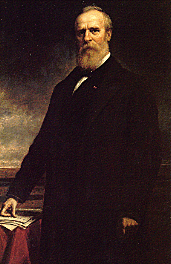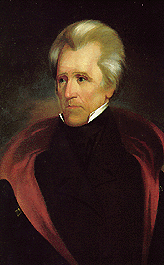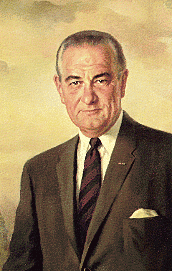
|

|
Born in Ohio in 1822, Hayes was educated at Kenyon College and Harvard Law School. After five years of law practice in Lower Sandusky, he moved to Cincinnati, where he flourished as a young Whig lawyer.
He fought in the Civil War, was wounded in action, and rose to the rank of brevet major general. While he was still in the Army, Cincinnati Republicans ran him for the House of Representatives. He accepted the nomination, but would not campaign, explaining, "an officer fit for duty who at this crisis would abandon his post to electioneer... ought to be scalped."
Elected by a heavy majority, Hayes entered Congress in December 1865, troubled by the "Rebel influences ... ruling the White House." Between 1867 and 1876 he served three terms as Governor of Ohio.
Safe liberalism, party loyalty, and a good war record made Hayes an acceptable Republican candidate in 1876. He opposed Governor Samuel J. Tilden of New York. Although a galaxy of famous Republican speakers, and even Mark Twain, stumped for Hayes, he expected the Democrats to win. When the first returns seemed to confirm this, Hayes went to bed, believing he had lost. But in New York, Republican National Chairman Zachariah Chandler, aware of a loophole, wired leaders to stand firm: "Hayes has 185 votes and is elected." The popular vote apparently was 4,300,000 for Tilden to 4,036,000 for Hayes. Hayes's election depended upon contested electoral votes in Louisiana, South Carolina, and Florida. If all the disputed electoral votes went to Hayes, he would win; a single one would elect Tilden.
Months of uncertainty followed. In January 1877 Congress established an Electoral Commission to decide the dispute. The commission, made up of eight Republicans and seven Democrats, determined all the contests in favor of Hayes by eight to seven. The final electoral vote: 185 to 184. Northern Republicans had been promising southern Democrats at least one Cabinet post, Federal patronage, subsidies for internal improvements, and withdrawal of troops from Louisiana and South Carolina.
Hayes insisted that his appointments must be made on merit, not political considerations. For his Cabinet he chose men of high caliber, but outraged many Republicans because one member was an ex-Confederate and another had bolted the party as a Liberal Republican in 1872.
Hayes pledged protection of the rights of Negroes in the South, but at the same time advocated the restoration of "wise, honest, and peaceful local self-government." This meant the withdrawal of troops. Hayes hoped such conciliatory policies would lead to the building of a "new Republican party" in the South, to which white businessmen and conservatives would rally.
Many of the leaders of the new South did indeed favor Republican economic policies and approved of Hayes's financial conservatism, but they faced annihilation at the polls if they were to join the party of Reconstruction. Hayes and his Republican successors were persistent in their efforts but could not win over the "solid South." Hayes had announced in advance that he would serve only one term, and retired to Spiegel Grove, his home in Fremont, Ohio, in 1881. He died in 1893.


|
He married his Stanford sweetheart, Lou Henry, and they went to China, where he worked for a private corporation as China's leading engineer. In June 1900 the Boxer Rebellion caught the Hoovers in Tientsin. For almost a month the settlement was under heavy fire. While his wife worked in the hospitals, Hoover directed the building of barricades, and once risked his life rescuing Chinese children.
One week before Hoover celebrated his 40th birthday in London, Germany declared war on France, and the American Consul General asked his help in getting stranded tourists home. In six weeks his committee helped 120,000 Americans return to the United States. Next Hoover turned to a far more difficult task, to feed Belgium, which had been overrun by the German army. After the United States entered the war, President Wilson appointed Hoover head of the Food Administration. He succeeded in cutting consumption of foods needed overseas and avoided rationing at home, yet kept the Allies fed.
After the Armistice, Hoover, a member of the Supreme Economic Council and head of the American Relief Administration, organized shipments of food for starving millions in central Europe. He extended aid to famine-stricken Soviet Russia in 1921. When a critic inquired if he was not thus helping Bolshevism, Hoover retorted, "Twenty million people are starving. Whatever their politics, they shall be fed!"
After capably serving as Secretary of Commerce under Presidents Harding and Coolidge, Hoover became the Republican Presidential nominee in 1928. He said then: "We in America today are nearer to the final triumph over poverty than ever before in the history of any land." His election seemed to ensure prosperity. Yet within months the stock market crashed, and the Nation spiraled downward into depression.
After the crash Hoover announced that while he would keep the Federal budget balanced, he would cut taxes and expand public works spending. In 1931 repercussions from Europe deepened the crisis, even though the President presented to Congress a program asking for creation of the Reconstruction Finance Corporation to aid business, additional help for farmers facing mortgage foreclosures, banking reform, a loan to states for feeding the unemployed, expansion of public works, and drastic governmental economy. At the same time he reiterated his view that while people must not suffer from hunger and cold, caring for them must be primarily a local and voluntary responsibility.
His opponents in Congress, who he felt were sabotaging his program for their own political gain, unfairly painted him as a callous and cruel President. Hoover became the scapegoat for the depression and was badly defeated in 1932. In the 1930's he became a powerful critic of the New Deal, warning against tendencies toward statism.
In 1947 President Truman appointed Hoover to a commission, which elected him chairman, to reorganize the Executive Departments. He was appointed chairman of a similar commission by President Eisenhower in 1953. Many economies resulted from both commissions' recommendations. Over the years, Hoover wrote many articles and books, one of which he was working on when he died at 90 in New York City on October 20, 1964.


|
Born in a backwoods settlement in the Carolinas in 1767, he received sporadic education. But in his late teens he read law for about two years, and he became an outstanding young lawyer in Tennessee. Fiercely jealous of his honor, he engaged in brawls, and in a duel killed a man who cast an unjustified slur on his wife Rachel.
Jackson prospered sufficiently to buy slaves and to build a mansion, the Hermitage, near Nashville. He was the first man elected from Tennessee to the House of Representatives, and he served briefly in the Senate. A major general in the War of 1812, Jackson became a national hero when he defeated the British at New Orleans.
In 1824 some state political factions rallied around Jackson; by 1828 enough had joined "Old Hickory" to win numerous state elections and control of the Federal administration in Washington. In his first Annual Message to Congress, Jackson recommended eliminating the Electoral College. He also tried to democratize Federal officeholding. Already state machines were being built on patronage, and a New York Senator openly proclaimed "that to the victors belong the spoils. "
Jackson took a milder view. Decrying officeholders who seemed to enjoy life tenure, he believed Government duties could be "so plain and simple" that offices should rotate among deserving applicants. As national politics polarized around Jackson and his opposition, two parties grew out of the old Republican Party--the Democratic Republicans, or Democrats, adhering to Jackson; and the National Republicans, or Whigs, opposing him.
Henry Clay, Daniel Webster, and other Whig leaders proclaimed themselves defenders of popular liberties against the usurpation of Jackson. Hostile cartoonists portrayed him as King Andrew I. Behind their accusations lay the fact that Jackson, unlike previous Presidents, did not defer to Congress in policy-making but used his power of the veto and his party leadership to assume command. The greatest party battle centered around the Second Bank of the United States, a private corporation but virtually a Government-sponsored monopoly. When Jackson appeared hostile toward it, the Bank threw its power against him.
Clay and Webster, who had acted as attorneys for the Bank, led the fight for its recharter in Congress. "The bank," Jackson told Martin Van Buren, "is trying to kill me, but I will kill it!" Jackson, in vetoing the recharter bill, charged the Bank with undue economic privilege. His views won approval from the American electorate; in 1832 he polled more than 56 percent of the popular vote and almost five times as many electoral votes as Clay.
Jackson met head-on the challenge of John C. Calhoun, leader of forces trying to rid themselves of a high protective tariff. When South Carolina undertook to nullify the tariff, Jackson ordered armed forces to Charleston and privately threatened to hang Calhoun. Violence seemed imminent until Clay negotiated a compromise: tariffs were lowered and South Carolina dropped nullification.
In January of 1832, while the President was dining with friends at the White House, someone whispered to him that the Senate had rejected the nomination of Martin Van Buren as Minister to England. Jackson jumped to his feet and exclaimed, "By the Eternal! I'll smash them!" So he did. His favorite, Van Buren, became Vice President, and succeeded to the Presidency when "Old Hickory" retired to the Hermitage, where he died in June 1845.


|
Freckled and sandy-haired, rather tall and awkward, Jefferson was eloquent as a correspondent, but he was no public speaker. In the Virginia House of Burgesses and the Continental Congress, he contributed his pen rather than his voice to the patriot cause. As the "silent member" of the Congress, Jefferson, at 33, drafted the Declaration of Independence. In years following he labored to make its words a reality in Virginia. Most notably, he wrote a bill establishing religious freedom, enacted in 1786.
Jefferson succeeded Benjamin Franklin as minister to France in 1785. His sympathy for the French Revolution led him into conflict with Alexander Hamilton when Jefferson was Secretary of State in President Washington's Cabinet. He resigned in 1793. Sharp political conflict developed, and two separate parties, the Federalists and the Democratic-Republicans, began to form. Jefferson gradually assumed leadership of the Republicans, who sympathized with the revolutionary cause in France. Attacking Federalist policies, he opposed a strong centralized Government and championed the rights of states.
As a reluctant candidate for President in 1796, Jefferson came within three votes of election. Through a flaw in the Constitution, he became Vice President, although an opponent of President Adams. In 1800 the defect caused a more serious problem. Republican electors, attempting to name both a President and a Vice President from their own party, cast a tie vote between Jefferson and Aaron Burr. The House of Representatives settled the tie. Hamilton, disliking both Jefferson and Burr, nevertheless urged Jefferson's election.
When Jefferson assumed the Presidency, the crisis in France had passed. He slashed Army and Navy expenditures, cut the budget, eliminated the tax on whiskey so unpopular in the West, yet reduced the national debt by a third. He also sent a naval squadron to fight the Barbary pirates, who were harassing American commerce in the Mediterranean. Further, although the Constitution made no provision for the acquisition of new land, Jefferson suppressed his qualms over constitutionality when he had the opportunity to acquire the Louisiana Territory from Napoleon in 1803.
During Jefferson's second term, he was increasingly preoccupied with keeping the Nation from involvement in the Napoleonic wars, though both England and France interfered with the neutral rights of American merchantmen. Jefferson's attempted solution, an embargo upon American shipping, worked badly and was unpopular.
Jefferson retired to Monticello to ponder such projects as his grand designs for the University of Virginia. A French nobleman observed that he had placed his house and his mind "on an elevated situation, from which he might contemplate the universe."
He died on July 4, 1826.


|
During the secession crisis, Johnson remained in the Senate even when Tennessee seceded, which made him a hero in the North and a traitor in the eyes of most Southerners. In 1862 President Lincoln appointed him Military Governor of Tennessee, and Johnson used the state as a laboratory for reconstruction. In 1864 the Republicans, contending that their National Union Party was for all loyal men, nominated Johnson, a Southerner and a Democrat, for Vice President.
After Lincoln's death, President Johnson proceeded to reconstruct the former Confederate States while Congress was not in session in 1865. He pardoned all who would take an oath of allegiance, but required leaders and men of wealth to obtain special Presidential pardons.
By the time Congress met in December 1865, most southern states were reconstructed, slavery was being abolished, but "black codes" to regulate the freedmen were beginning to appear. Radical Republicans in Congress moved vigorously to change Johnson's program. They gained the support of northerners who were dismayed to see Southerners keeping many prewar leaders and imposing many prewar restrictions upon Negroes.
The Radicals' first step was to refuse to seat any Senator or Representative from the old Confederacy. Next they passed measures dealing with the former slaves. Johnson vetoed the legislation. The Radicals mustered enough votes in Congress to pass legislation over his veto--the first time that Congress had overridden a President on an important bill. They passed the Civil Rights Act of 1866, which established Negroes as American citizens and forbade discrimination against them.
A few months later Congress submitted to the states the Fourteenth Amendment, which specified that no state should "deprive any person of life, liberty, or property, without due process of law." All the former Confederate States except Tennessee refused to ratify the amendment; further, there were two bloody race riots in the South. Speaking in the Middle West, Johnson faced hostile audiences. The Radical Republicans won an overwhelming victory in Congressional elections that fall.
In March 1867, the Radicals effected their own plan of Reconstruction, again placing southern states under military rule. They passed laws placing restrictions upon the President. When Johnson allegedly violated one of these, the Tenure of Office Act, by dismissing Secretary of War Edwin M. Stanton, the House voted eleven articles of impeachment against him. He was tried by the Senate in the spring of 1868 and acquitted by one vote. In 1875, Tennessee returned Johnson to the Senate. He died a few months later.


|
Johnson was born on August 27, 1908, in central Texas, not far from Johnson City, which his family had helped settle. He felt the pinch of rural poverty as he grew up, working his way through Southwest Texas State Teachers College; he learned compassion for the poverty of others when he taught students of Mexican descent.
In 1937 he campaigned successfully for the House of Representatives on a New Deal platform, effectively aided by his wife, the former Claudia "Lady Bird" Taylor, whom he had married in 1934.
During World War II he served briefly in the Navy as a lieutenant commander, winning a Silver Star in the South Pacific. After six terms in the House, Johnson was elected to the Senate in 1948. In 1953, he became the youngest Minority Leader in Senate history, and the following year, when the Democrats won control, Majority Leader. With rare skill he obtained passage of a number of key Eisenhower measures.
In the 1960 campaign, Johnson, as John F. Kennedy's running mate, was elected Vice President. On November 22, 1963, when Kennedy was assassinated, Johnson was sworn in as President. First he obtained enactment of the measures President Kennedy had been urging at the time of his death--a new civil rights bill and a tax cut. Next he urged the Nation "to build a great society, a place where the meaning of man's life matches the marvels of man's labor." In 1964, Johnson won the Presidency with 61 percent of the vote and had the widest popular margin in American history--more than 15,000,000 votes.
The Great Society program became Johnson's agenda for Congress in January 1965: aid to education, attack on disease, Medicare, urban renewal, beautification, conservation, development of depressed regions, a wide-scale fight against poverty, control and prevention of crime and delinquency, removal of obstacles to the right to vote. Congress, at times augmenting or amending, rapidly enacted Johnson's recommendations. Millions of elderly people found succor through the 1965 Medicare amendment to the Social Security Act.
Under Johnson, the country made spectacular explorations of space in a program he had championed since its start. When three astronauts successfully orbited the moon in December 1968, Johnson congratulated them: "You've taken all of us, all over the world, into a new era. "
Nevertheless, two overriding crises had been gaining momentum since 1965. Despite the beginning of new antipoverty and anti-discrimination programs, unrest and rioting in black ghettos troubled the Nation. President Johnson steadily exerted his influence against segregation and on behalf of law and order, but there was no early solution.
The other crisis arose from Viet Nam. Despite Johnson's efforts to end Communist aggression and achieve a settlement, fighting continued. Controversy over the war had become acute by the end of March 1968, when he limited the bombing of North Viet Nam in order to initiate negotiations. At the same time, he startled the world by withdrawing as a candidate for re-election so that he might devote his full efforts, unimpeded by politics, to the quest for peace.
When he left office, peace talks were under way; he did not live to see them successful, but died suddenly of a heart attack at his Texas ranch on January 22, 1973.
